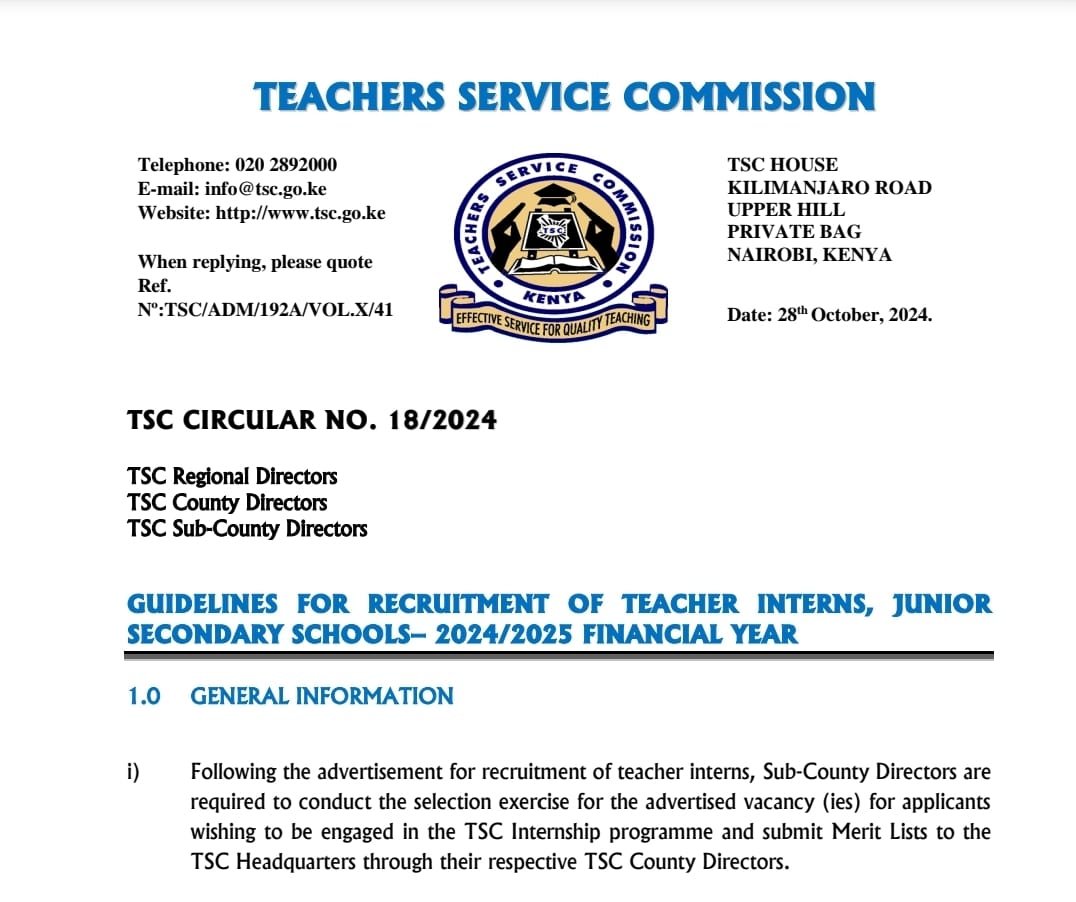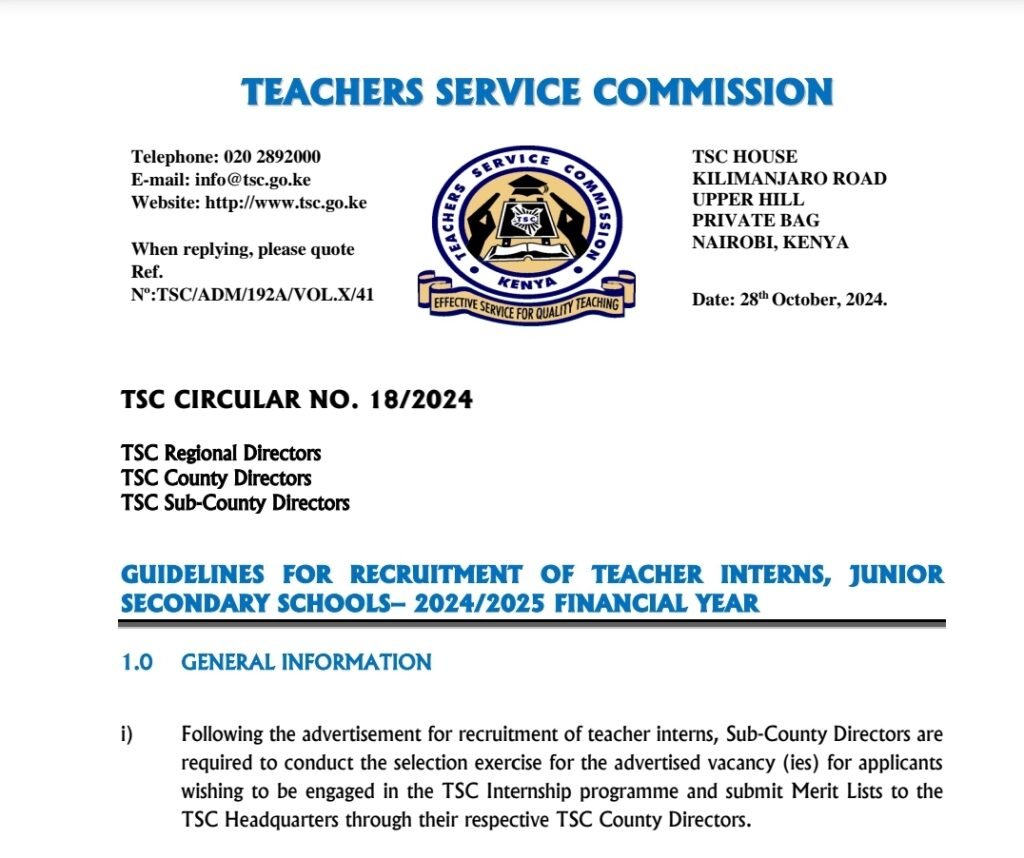Comprehensive Guide to Document Preparation After Your Teacher Internship Application

TSC circular

Introduction to Teacher Internship Applications
Teacher internships serve as a crucial bridge between theoretical learning and practical application in the field of education. They provide aspiring educators with the opportunity to gain firsthand experience in classroom settings, allowing them to observe, assist, and ultimately hone their teaching skills under the guidance of experienced professionals. The significance of these internships cannot be overstated; they are often a fundamental component of teacher training programs, ensuring that future educators are well-prepared to enter the workforce.
One of the primary purposes of a teacher internship is to facilitate the transition from student to educator. This experiential learning phase enables candidates to apply pedagogical theories and methodologies learned during their academic studies. Interns engage directly with students, create lesson plans, and execute classroom management strategies, thereby solidifying their understanding of educational practices. Furthermore, these internships allow candidates to build vital professional relationships within the educational community, potentially leading to future job opportunities and collaborations.
Proper document preparation is paramount for a successful teacher internship application. In a competitive landscape, clear, organized, and well-articulated documents can distinguish a candidate from others. Essential materials such as resumes, cover letters, and recommendation letters play a significant role in presenting an intern’s qualifications and enthusiasm for the teaching profession. These documents not only reflect the applicant’s achievements and competencies but also provide insight into their commitment to education and readiness to contribute positively to a teaching environment.
Moreover, documents submitted during the internship application process serve as a first impression for the hiring institutions. In essence, they convey professionalism and a serious approach to the internship opportunity. With appropriate document preparation, candidates can enhance their chances of selection, thereby paving the way for valuable experiences that shape their teaching careers. Overall, investing time and effort into creating compelling documents is an essential step in securing a position within a teacher internship program.
Understanding Required Documents
When applying for a teacher internship, it is crucial to prepare a range of documents that showcase your qualifications and commitment to the teaching profession. Understanding each document’s importance will help streamline your application process and increase your chances of success.
First and foremost, academic transcripts are often required. These transcripts provide evidence of your academic performance and progression in your educational program. It is advisable to request an official copy directly from your institution. Ensure that it is up-to-date and includes all relevant coursework, particularly those courses related to education and pedagogical approaches.
Letters of recommendation are another key component of your application. These letters should ideally come from educators, professors, or supervisors who are familiar with your skills and dedication to teaching. When requesting a letter, it is effective to provide your recommender with details about the internship role and your aspirations. This approach facilitates a more tailored and compelling recommendation.
Personal statements are integral to articulating your motivations, goals, and unique experiences that qualify you for the internship. It is essential to clearly communicate why you are passionate about teaching and what you hope to achieve during your internship. A well-structured statement can significantly enhance your application. Be sure to follow any specific prompts provided by the internship program.
Finally, some internship programs may require additional paperwork, such as background checks, proof of certifications, or even a portfolio of your work. Reviewing the specific requirements for each internship will ensure that you submit a complete and professional application package.
Crafting an Impressive Resume
Creating a compelling resume is a fundamental step in the teacher internship application process. A well-structured resume helps differentiate candidates, allowing them to present their qualifications and experiences succinctly. To begin, it is essential to choose a clear and professional format, which often includes sections such as contact information, objective statement, education, experience, skills, and references. The resume should ideally be one page long, particularly for those early in their careers.
When articulating your objective statement, tailor it specifically to teacher internships by clearly expressing your passion for education and desire to contribute to the learning environment. Emphasizing shared values with the prospective institution can further illustrate your enthusiasm for the role. Following the objective, detail your educational qualifications, ensuring to include relevant coursework and any certifications that enhance your candidacy. This section should demonstrate your foundational knowledge in education, which is critical for a teaching role.
Highlighting relevant experiences is vital in your resume as well. If you have prior experience in tutoring, volunteering in schools, or participating in educational programs, be sure to elaborate on these roles. Use action verbs to describe your responsibilities and achievements, thereby showcasing your skills in curriculum development, classroom management, and student engagement. Additionally, including relevant skills is crucial; consider listing attributes such as communication, patience, organization, and adaptability—traits that are valuable in teaching settings.
Finally, ensure your references are from reputable individuals who can vouch for your abilities and character in educational contexts. By following these guidelines, you will create an impressive resume that effectively communicates your qualifications and readiness for a teacher internship, ultimately increasing your chances of securing the position.
Writing a Powerful Personal Statement
Crafting a powerful personal statement is a crucial step in applying for a teacher internship. This document serves not only as an introduction but also as an opportunity to express your genuine passion for education. Begin by articulating your motivation for teaching. Reflect on the moments that inspired you to pursue this profession, such as influential educators or transformative learning experiences. This personal insight will engage the reader and convey your long-term commitment to the field of education.
In addition, it is essential to highlight relevant experiences that have shaped your teaching aspirations. Whether it involves volunteer work, tutoring roles, or participation in educational programs, outlining these experiences provides concrete examples of your involvement in the educational community. This not only demonstrates your practical understanding of teaching but also showcases your readiness to embrace the responsibilities of a teacher intern.
Equally important is the articulation of your personal philosophy of education. This philosophy serves as a framework for your teaching approach and can greatly impact your effectiveness in the classroom. Consider discussing how you plan to foster a positive learning environment and promote student engagement. By connecting your philosophy to your motivational themes and experiences, you build a cohesive narrative that underscores your passion for teaching and educates the reader about your values as an emerging educator.
Finally, it is vital to link these elements back to the specific internship for which you are applying. Research the institution’s mission, values, and programs to tailor your statement. Demonstrate how your personal philosophy and experiences align with their objectives. A well-rounded personal statement not only conveys who you are as an individual but also establishes your potential as a contributor to the educational community. Striking this balance will enhance the likelihood of successfully securing the internship position.
Recommendations Letters: Who to Ask and How to Prepare
Recommendation letters play a critical role in the teacher internship application process, serving as external validation of a candidate’s abilities, experiences, and character. These letters can significantly influence the selection committee’s perception, highlighting key strengths and unique qualities that may not be reflected in a resume or cover letter. Therefore, choosing the right individuals to write these letters is paramount.
When considering whom to ask for recommendation letters, it is essential to select individuals who have a thorough understanding of your skills and experiences in the educational field. Potential recommenders may include professors who have taught you relevant coursework, employers from educational settings, or supervising teachers from prior internships or volunteer opportunities. Each of these individuals can provide different perspectives on your capabilities, allowing for a well-rounded representation of your qualifications.
Once you identify suitable candidates for your recommendation letters, preparation becomes the next crucial step. It is advisable to schedule an informal meeting or conversation to discuss your internship application and the expectations of the recommendation. Sharing specific details about the internship program, including its goals and values, can help your recommenders tailor their letters effectively. Additionally, providing them with your resume, relevant coursework, and a summary of your experiences can give them a clearer picture of your qualifications and contributions in the educational field.
Furthermore, expressing your gratitude and willingness to provide any additional information can facilitate a positive experience for both you and your recommenders. Clear communication and thoughtful preparation enhance the likelihood of receiving impactful letters that resonate with hiring committees. In conclusion, well-crafted recommendation letters can be pivotal to your teacher internship application, emphasizing why you are a strong candidate for the role. Selecting knowledgeable recommenders and preparing them adequately will significantly bolster your application.
Document Formatting and Presentation Matters
The significance of document formatting and presentation cannot be overstated when submitting materials for a teacher internship application. A well-structured and visually appealing document not only reflects professionalism but also indicates the applicant’s attention to detail and seriousness about the opportunity. To achieve a polished look, certain guidelines should be adhered to regarding font choices, spacing, and overall layout.
When selecting fonts, it is essential to choose styles that are legible and convey professionalism. Commonly recommended fonts include Arial, Calibri, and Times New Roman, with a standard font size of 10 to 12 points. Utilizing bold or italic styles sparingly can enhance specific sections without compromising readability. It is advisable to maintain consistency in font type and size throughout all documents submitted in the application package.
Line spacing is another crucial aspect of document presentation. A standard spacing of 1.15 to 1.5 is generally optimal, as it ensures adequate white space, making the content more accessible for readers. Margins should be set at one inch on all sides, creating a balanced and uncluttered appearance. Additionally, the use of bullet points and numbered lists can help to organize information effectively, allowing key points to stand out without overwhelming the reader.
Attention to layout further enhances document clarity. Each section should be clearly labeled, such as “Objective,” “Experience,” and “Education,” thus guiding the reviewer through the content seamlessly. Headers can also be utilized to delineate these sections. Furthermore, consider including a header with your name and contact information to ensure it remains visible throughout the document. By prioritizing these formatting elements, applicants can create a professional image that supports their candidacy for the teaching internship.
Creating a Teaching Portfolio
In the realm of education, a well-crafted teaching portfolio is an essential element that effectively showcases a candidate’s qualifications, skills, and readiness for a teaching position. During the internship application process, the portfolio serves as a tangible representation of one’s pedagogical philosophy, instructional strategies, and commitment to student learning. It is vital to curate a collection that reflects your unique teaching style and educational background.
One of the fundamental components of a teaching portfolio is the inclusion of lesson plans. These plans should not only demonstrate your understanding of curriculum standards but also reflect your ability to engage and adapt to diverse student needs. Each lesson plan included can provide insights into your teaching objectives, the materials used, assessment methods, and the rationale behind your chosen instructional strategies. This section of the portfolio highlights your readiness to facilitate effective learning experiences.
Furthermore, articulating your educational philosophy is paramount in showcasing your beliefs and values regarding teaching and learning. This statement should encompass your views on student engagement, inclusivity, and the role of assessment in the educational process. It offers a window into your thought processes and demonstrates your commitment to fostering a positive learning environment. Additionally, incorporating examples of previous work, such as student projects or collaborative learning activities, can further illustrate your effectiveness as an educator.
Overall, a comprehensive teaching portfolio should provide a holistic view of your qualifications and aspirations as a future teacher. This pivotal document should be meticulously organized and thoughtfully presented, reflecting not only your skills but also your passion for education. By strategically including well-developed lesson plans, a clear educational philosophy, and a selection of previous work, you can create a portfolio that distinguishes you as a compelling candidate for any teaching internship.
Reviewing and Proofreading Your Documents
After completing your teacher internship application, it is essential to engage in a thorough review and proofreading process. This step is vital, as it ensures that your application documents are polished, professional, and free from errors that could detract from your qualifications or commitment. A meticulous review enhances clarity, accuracy, and overall presentation, making a substantial difference in the impression you leave on selection committees.
Begin by revisiting the guidelines provided for the application. Each application may have specific requirements concerning formatting, length, and content structure. By checking these details, you can ensure that your documents align with what the institutions are expecting, preventing any unnecessary disqualifications due to non-compliance.
Next, focus on content clarity and coherence. Read each document multiple times to identify areas where your arguments may be weak or unclear. It might be helpful to read your documents aloud; this practice can make awkward phrases or omissions more apparent. Moreover, consider the flow of information: does your narrative logically progress, or does it need reorganization for better impact?
Grammar and punctuation are equally crucial. Utilize grammar-checking tools, but do not rely solely on them. Human judgment is irreplaceable; therefore, take the time to examine sentence structure and word choice for precision. Pay attention to common pitfalls such as subject-verb agreement and consistent tense usage. An error-free document not only reflects your attention to detail but also your professionalism.
Obtaining feedback from peers or mentors can provide invaluable insights. Sharing your application with someone who has experience in the field can illuminate any oversights that you may have missed. They can offer constructive criticism and suggestions that can elevate the quality of your documents further, ensuring your application stands out among others in a competitive field.
Conclusion and Final Tips for Success
Thorough document preparation is a crucial element in securing a teacher internship. It serves as the foundation for establishing a professional image that reflects your dedication and commitment to the teaching field. Collecting and organizing your application materials meticulously can greatly enhance your chances of standing out in a competitive pool of candidates. Start by carefully gathering all necessary documents such as your resume, cover letter, letters of recommendation, and relevant certifications. Each document must be tailored specifically to the internship you are applying for, highlighting your strengths and experiences in a manner that aligns with the requirements of the position.
Time management plays a vital role in ensuring you complete your application in a timely manner. Create a timeline that includes specific deadlines for each part of the application process. This structured approach will not only help you avoid the stress of last-minute submissions but also allow time for revisions and feedback. Being organized with your documents and deadlines can significantly boost your confidence, knowing that you’ve devoted sufficient time and effort to present your best self to potential employers.
Additionally, maintaining a positive mindset throughout your application journey is essential. The process can be daunting and may come with setbacks, but facing challenges with resilience and optimism can make a significant difference. Remember to seek support from peers, mentors, or online communities who share similar experiences. Engaging with others can provide encouragement and new perspectives that might enhance your application materials.
By emphasizing thorough preparation, effective time management, and a proactive attitude, you position yourself for success in securing a teacher internship that can enrich your professional journey. Stay focused, be diligent, and approach the application process with enthusiasm and a sense of purpose.






